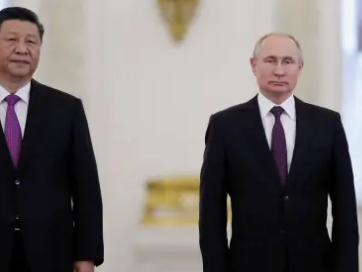China’s support for Russia risks working against its desire to bring Taiwan under its control.
On June 25, 1950, with Joseph Stalin’s backing, North Korean leader Kim Il-Sung sent troops across the thirty-eighth parallel, hoping to unify the Korean Peninsula by force. China’s leader, Mao Zedong, lent his support to the effort, but soon found that doing so put Taiwan out of his reach. While the United States had essentially washed its hands of the nationalists one year prior, President Truman declared that “in these circumstances the occupation of Formosa by Communist forces would be a direct threat to the security of the Pacific area.” To prevent an attack on Formosa (Taiwan), President Truman ordered the Seventh Fleet to patrol the Taiwan Strait. The Soviet Union’s decision to encourage North Korean aggression ended up costing China the chance to bring Taiwan under its control. Nearly three-quarters of a century later, China’s support of Russian aggression against Ukraine will similarly undermine its interests in the Taiwan Strait.
Counterintuitively, the months leading up to Putin’s attack on Ukraine have increased the focus on Taiwan, with analysts weighing whether Russian aggression against Ukraine would invite a similar Chinese attack on Taiwan. Many who are advocating the United States do less to counteract Russian aggression against Ukraine are doing so by arguing that it is a distraction from the graver danger: a Chinese invasion of Taiwan. The upshot is that the current crisis in Europe has sharpened a debate about where the United States should deploy its finite resources, with a growing chorus advocating that the United States should direct its energy toward preparing to defend Taiwan. A heightened U.S. focus on Taiwan and a consensus that it needs to prepare for a conflict in the Taiwan Strait would not be welcomed in Beijing.
In addition, a Chinese attack on Taiwan, following on the heels of a Russian invasion of Ukraine, is now far more likely to trigger a U.S. and allied response. If the United States were to stand aside in the face of blatant aggression by its two principal geopolitical rivals, it would lose credibility among its allies in Europe and Asia and watch as the two most critical regions to the global balance of power fall under the sway of Russia and China. China will find that Putin’s gambit has increased Taiwan’s salience in Washington, Brussels, and Tokyo and makes intervention almost a certainty. In the face of Russia’s attack, the United States and its allies and partners will also likely strengthen ties with Taiwan both to reassure Taiwan and deter China.
In addition, a Chinese attack on Taiwan, following on the heels of a Russian invasion of Ukraine, is now far more likely to trigger a U.S. and allied response. If the United States were to stand aside in the face of blatant aggression by its two principal geopolitical rivals, it would lose credibility among its allies in Europe and Asia and watch as the two most critical regions to the global balance of power fall under the sway of Russia and China. China will find that Putin’s gambit has increased Taiwan’s salience in Washington, Brussels, and Tokyo and makes intervention almost a certainty. In the face of Russia’s attack, the United States and its allies and partners will also likely strengthen ties with Taiwan both to reassure Taiwan and deter China.
By David Sacks
Council on Foreign Relations






























